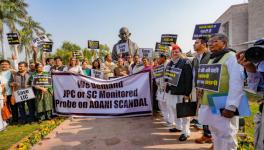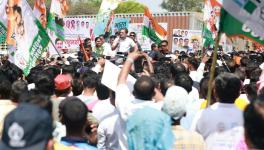Terrorism Enters Poll Campaign through Punjab
Representational use only.
Modern popular liberal democracies thrive on creating an enemy. India is no exception. In the seventies, the Shiv Sena identified South Indians in Mumbai as the enemy, but over time, this movement withered away. Though the Maharashtra Navnirman Sena created a similar furore against the “bhaiyas”—migrants from North India—it had a short lifespan.
An election is the most opportune time to create enemies and instil fear amongst voters. It seems the election campaigns have another important element in such situations. A party tends to present itself as a saviour of the people. We see this phenomenon time and again in Indian elections, as most political parties tactically offer themselves as protectors. To project their party as a messiah of the people is the usual approach, but the content a party deploys when doing so makes the crucial difference. It is because intense propaganda comes into play when they strive to convince the people they are the guardian angel.
Everybody knows, the major issues that need redressal in India are poverty, unemployment and social and economic inequalities. However, the political parties focus on issues that are secondary to the country, society and nation. So, nationalism, terrorism, cow protection, Pakistan, perceived security threats, separatism (tukdey-tukdey gang) etc., emerge time and again in the elections. Simultaneously, other specific issues do emerge in each state at the time of an Assembly election. But rarely do we find one specific issue becoming common across multiple states. For example, the stray cattle menace has emerged as a major poll issue in the Uttar Pradesh election, whereas illegal sand mining was an issue in Punjab’s just-concluded election.
A new trend is progressively occupying centre-stage in India in general—and the state elections are no exception to it. We find the candidates and “star campaigners” of parties accuse Opposition party candidates or leaders of misdoings and illegal actions. This trend does not completely lack any rational assumption, in that those levelling such accusations expect people to be changeable or fickle-minded and accept such labels. The important thing is to make their accusations with authority and emphasis. Congress leader Rahul Gandhi charged Delhi Chief Minister and Aam Aadmi Party convenor Arvind Kejriwal with staying at the house of a Khalistani terrorist in a speech delivered at Mohali on 17 February. Prime Minister Narendra Modi, in an election rally in Punjab, also attacked Kejriwal over the terrorism charge, following Kumar Vishwas’s accusations.
Interestingly, the Chief Minister of Punjab Charanjit Singh Channi wrote an official letter to Union Home Minister Amit Shah, requesting him to investigate the allegations. Even the Home Minister responded, saying he would examine the matter. Ironically, a few weeks before the Punjab election, the Enforcement Directorate had raided the house of the nephew of the Punjab Chief Minister and found crores of rupees allegedly earned through illegal sand mining. It was becoming quite obvious that the Chief Minister could be implicated in this case. It would not be the first case in which the BJP government at the Centre would have targeted a Chief Minister of Punjab. Earlier, former Chief Minister Amarinder Singh’s son was also quizzed in a money laundering case. This investigation paved the way before he joined hands with the BJP in the Assembly election, after the Congress high command asked him to resign.
No matter what political leaders say, terrorism in Punjab is long dead. Only a few members of the Sikh diaspora in some western countries ever raise their voice about Khalistan in this day and age. Instead, many former militants in Punjab have abandoned the path of violence and terrorism and joined mainstream politics. Some of them are members of the main political parties, the Congress Party, Akali Dal and others who are the BJP’s alliance parties. Nobody mentions these leaders because they are not terrorists and have become popular leaders. The Aam Aadmi Party did not raise any issue with regard to these leaders either.
The process of labelling social activists as terrorists has intensified after the amendment to the Unlawful Activities (Prevention) Act or UAPA in 2019. We should understand that after 9/11 the term terrorism has been frequently misused in such a way that any act of violence is interpreted as terrorism.
The functional utility of accusing opponents during elections has created serious malfunctions in the Indian political system. The story does not stop here. In his rallies in Uttar Pradesh, the Prime Minister used this catchphrase twice. If the Sikhs became the target of this accusation in Punjab, the Muslims have become the object of ridicule through the use of this term in Uttar Pradesh and elsewhere. The farce of the overuse of this buzzword was evident when, after the verdict of the Ahmedabad bombing case of 2008, the Prime Minister said in a rally that the bicycle was used to explode the bombs there. The cycle being the election symbol of the Samajwadi Party, it appeared the statement sought to raise doubts about it. It is a well known fact that the Samajwadi Party’s vote bank includes backward sections and the Muslims.
Obviously, the objective of the political discourse on terrorism is to instil fear among the people and offer oneself as the saviour—a time-tested political tactic. However, one should be aware of the pitfalls of such a discourse. Mark Juergensmeyer, in his book Terror in the Mind of God, takes cognisance of religious terrorism all over the world and finds no religion is an exception. Besides, if some people belong to any religion resort to terrorism, it never implies that the entire community has become terrorist! There is a need for every political party to understand this reality and accordingly make amends.
A political strategy which creates an enemy is quite common in Indian politics as well as in other countries. However, polarising communities for electoral gains may lead to a permanent divide and turn out to be against the interests of the nation.
The author was professor of sociology at Guru Nanak Dev University, Amritsar, and is a former president of the Indian Sociological Society. The views are personal.
Get the latest reports & analysis with people's perspective on Protests, movements & deep analytical videos, discussions of the current affairs in your Telegram app. Subscribe to NewsClick's Telegram channel & get Real-Time updates on stories, as they get published on our website.
























